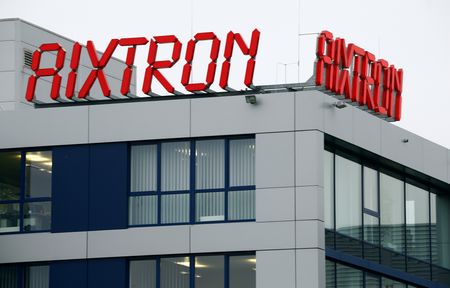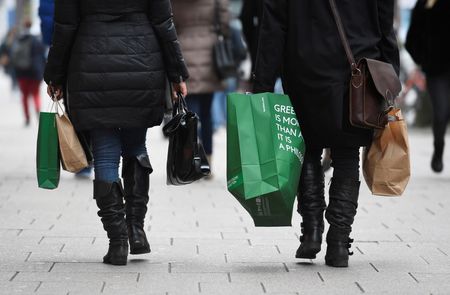By Ozan Ergenay
(Reuters) -German chip systems manufacturer Aixtron on Wednesday reported a 10% increase in quarterly orders and stood by its full-year guidance, saying the risks associated with U.S. tariffs policy were “currently insignificant for the sector”.
The company posted a first-quarter order intake of 132.2 million euros ($150.5 million), helped by high demand from Asia.
“The risks associated with U.S. tariffs policy are currently considered insignificant, as semiconductor equipment is currently not subject to U.S. tariffs,” Aixtron said in a statement.
Shares in Aixtron, which have fallen 25.5% since the start of the year, were up 3.7% in Frankfurt as of 0636 GMT.
U.S. President Donald Trump’s sweeping tariffs and uncertainty over his trade policies have rocked global markets and drained investors’ economic optimism.
Yet, tech and auto-related stocks received something of a reprieve after China exempted some goods from U.S. tariffs and the U.S. removed smartphones and other electronics from its tariffs on China.
Trump also signed an order on Tuesday to soften the blow of his auto tariffs.
Aixtron said it will monitor the impact of U.S. tariffs and any countermeasures to assess effects on its supply chain and production, as well as customer demand, and to “take corrective actions if necessary”.
It made first-quarter revenue of 112.5 million euros, exceeding analysts’ expectations of 102.5 million euros in a poll by LSEG.
“We are pleased with the start of the new year. The higher order intake compared to the previous year confirms that our product range is very well positioned, even in a challenging market environment,” CEO Felix Grawert said.
Aixtron also said it expects revenues in a range of around 120 million to 140 million euros for the second quarter, compared to 131.8 million euros last year.
Analysts at Jefferies say Aixtron’s first-quarter sales and orders came in well above estimates, saying that the timing of recovery is difficult to assess.
($1 = 0.8782 euros)
(Reporting by Ozan Ergenay in Gdansk. Editing by Kirsti Knolle, Mark Potter and Jan Harvey)









